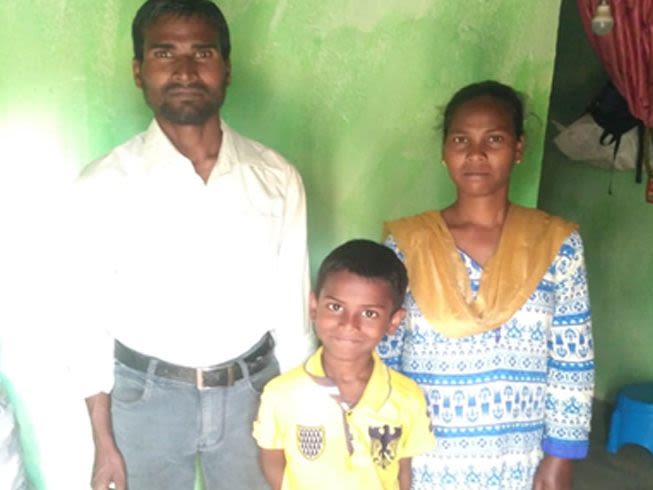
“I felt I was dreaming …”
For three days, blind Anna and her granddaughter lived on nothing but water and a daily cup of milk, given by a neighbour, which the pair shared between them. Locusts had destroyed the harvest from Anna’s little patch of land. She had no other source of food and was expecting to die. Then her pastor came visiting and told her there was food given by Barnabas Fund. All she had to do was go to the church and collect it.

“I felt as if I was dreaming,” remembered 85-year-old Anna, “because no person had ever come to my house with such news.” She called her little granddaughter, who led Anna by her stick, as is customary in Uganda, and before long they were back home with her pack of maize, beans, cooking oil and salt.
Hundreds of thousands are hungrylike Anna
Millions of our brothers and sisters in Africa, Asia and the Middle East are enduring severe food shortages; many face the possibility of death by starvation. For some it is locust swarms. For others it is Covid-19 lockdown. In parts of East Africa and Pakistan it is both disasters simultaneously.

Dual plagues of locusts and Covid-19 create hunger crisis
A locust plague on a scale unknown in at least a generation has invaded East Africa and Pakistan. Billions of insects devastated crops in the first wave earlier in 2020, then a deadly second wave numbering in the trillions ravaged a precious second-planting of crops.

In East Africa especially, many people are subsistence farmers, living on what they grow, so this is causing immense hardship. The UN has warned that the region is on the verge of a food crisis.
A third generation of locusts is expected to hatch in June and July, with the warnings that this time the swarms could spread across the Sahel to West Africa too.
Then the coronavirus pandemic struck Africa and much of Asia in March, unleashing a shockwave of destitution and food shortages. Many Christians in Asia and Africa earn their living in low-paid jobs, without regular salaries. These “daily-wage earners” are paid only for each day’s work they do. When lockdown began, they lost their income.
Too poor to have savings or any valuables to sell, they soon finished the meagre food stocks in their home.

Persecuted Christians left to starve under Covid-19 lockdown
The unprecedented global crisis is placing many vulnerable, already persecuted and marginalised Christians under even greater threat of hunger.
No food unless you renounce Jesus Christ
Pastor “James” tried to collect food that the Indian government provided for poor and needy families affected by the lockdown. But the distribution was organised by local Hindu extremist groups, which dominate the government in the state where Pastor James lives. They refused to give him anything unless he renounced his faith in the Lord Jesus. Of course, Pastor James would not deny his beloved Saviour, so he went home empty-handed to his hungry family.
In response to the impact of the locust plague and Covid-19, Barnabas Fund has fed more than HALF A MILLION hungry Christians across 30 countries so far.
Barnabas is helping to feed and provide other basic needs for hungry Christians in the time of coronavirus and locust plague.
£20 ($24; €22) could provide a hungry locust-affected family in Uganda with a life-saving staple food pack of maize, beans, cooking oil and salt.
£14 ($18; €16) could provide potatoes, onions and cooking oil for an Indian family facing hunger under Covid-19 lockdown.
£10 ($12; €11) could provide a Christian child in Zimbabwe with daily hot meals for a month.
This Pentecost, will you help hungry Christians to know that their family is standing with them in their time of greatest hardship?